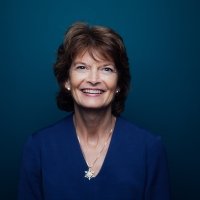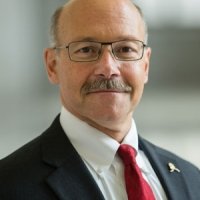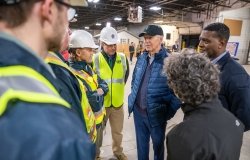The North American Arctic: Building a Vision for Regional Collaboration
Please join Mike Sfraga of the Wilson Center's Polar Initiative and John Higginbotham of the Centre for International Governance Innovation's Arctic Program to discuss the economic development opportunities, infrastructure needs and investment strategies.
Overview
Senator Lisa Murkowski (R-AK) Keynote Address
The North American Arctic: Building a Vision for Regional Collaboration
Coverage by John Milewski with photographs by Christopher Cruz
Senator Lisa Murkowski kicked off the public portion of the Wilson Center’s day-long focus on the Arctic with a keynote address followed by a question and answer session with attendees. Alaska’s senior senator made clear that her chief priority was for the residents of the region. She also stressed the importance of thinking of the Arctic regionally, shifting focus from north-south to east-west relations, and increasing investment in infrastructure.
The remarks and conversation took place at a March 27, 2017 conference co-hosted by the Wilson Center’s Polar Initiative and the Centre for International Governance Innovation’s Arctic Program. Webcasts of Senator Murkowski’s remarks and the panels that followed can be viewed above.
Key Quotes by Lisa Murkowski
OPENING REMARKS
“This is a great opportunity to look at regional cooperation within the Arctic, and how we can collaborate and really use our combined leverage to make the priorities of the north priorities in our respective regions.”
REFLECTING ON AN ARCTIC MEETING THAT TOOK PLACE IN 2014
“What struck me so much was the disconnect that can occur when Arctic policy is being driven and decided from thousands and thousands of miles away.
“Local input was only welcome when it served to advance a pre-set agenda. Forming a genuine partnership does matter.”
IMPORTANCE OF ROLE OF ARCTIC RESIDENTS
“While not all residents of the Arctic have a graduate degree, have a business degree… they do have a Masters in Arctic living and they can be absolutely useful, if not indispensable, in resource development plans for their region.”
“What happens in the Arctic doesn’t stay in the Arctic, but the people who live there do.”
ON DEVELOPMENT AND INFRASTRUCTURE
“Development and infrastructure levels differ greatly… it’s effectively two Arctics. A greater focus on regional development might help create economies of scale with areas with similar needs.”
“The limited amount of existing infrastructure is an opportunity for us to plan and to build in a forward thinking responsible manner that benefits both the community and the investor and not just how the military might have needed it 60 years ago.”
“We don’t need our federal governments to save us from ourselves or to tell us what our best interests are. What we need is for our federal governments to be true partners to advance the quality of life in the Arctic while we work to develop sustainable economies, sustainable communities, and a future that our people look to with the hope and excitement about the opportunities that are there in front of them.”
ON THE POSSIBILITIES
“We recognize that we have an opportunity here with waterways that are now open for longer periods of time, as Jane Harman mentioned in the introduction, it’s as if there has been a new ocean that has been discovered…. and what does that mean from the perspective of trade?”
“The Arctic for far too long has been viewed as a foreboding place that was not accessible. Accessibility is changing the way the world is viewing the Arctic.”
“How we take advantage of this stepped up interest in this part of the globe is our challenge. It is opening eyes to many for whom the Arctic was not only not a priority but it was not even on their radar screen. We are now on the screen… we’re on the map. It’s an exciting time.”
Meeting Agenda
Introduction:
- The Honorable Jane Harman, President and CEO, Wilson Center
Keynote:
- The Honorable Lisa Murkowski, U.S. Senator for Alaska
Discussion:
North American Arctic Regional Leaders: What are the needs and the future of the five NAA sub-national governments and their most pressing challenges today?
- The Honourable Peter Taptuna, Premier, Government of Nunavut
- The Honourable Vittus Qujaukitsoq, Minister of Industry, Labour, Trade, Energy and Foreign Affairs, Government of Greenland
- The Honorable Byron Mallott, Lieutenant Governor of Alaska
- The Honourable Larry Bagnell, Member of Parliament for Yukon, Government of Canada
- Moderator: Mike Sfraga, Director Polar Initiative, Wilson Center
Investing in the North American Arctic: The Arctic is the planet's next major investment venue. What are the opportunities for sustained economic and community growth?
- Laura Dawson, Director, Canada Institute, Wilson Center
- Kells Boland, Founding Principal, PROLOG Canada
- Maryscott Greenwood, Principal, Dentons
- Mead Treadwell, former Lieutenant Governor of Alaska
- Lillian Brewster, VP Indigenous Community Relations & Development, ATCO Group
- Cedar Swan, CEO, Adventure Canada
- Moderator: John Higginbotham, Head of Arctic Program, CIGI
National Representatives: U.S., Canada and Denmark: What are the unique interests in the Arctic for these countries and what are their plans for the Arctic region in the future?
- Stephen Van Dine, Assistant Deputy Minister, Northern Affairs, Indigenous and Northern Affairs Canada
- Moderator: Jennifer Spence, CIGI Research Associate and PhD Candidate, Carleton University
Closing Remarks
- Mayor Madeleine Redfern, City of Iqaluit
- John Higginbotham and Mike Sfraga
Speakers
The Honourable Larry Bagnell
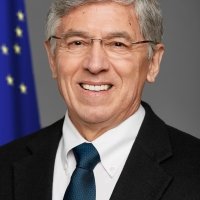
The Honorable Byron Mallott
The Honourable Vittus Qujaukitsoq
The Honourable Peter Taptuna

Laura Dawson
Executive Director, Future Borders Coalition
Kells Boland
Maryscott Greenwood
Stephen Van Dine
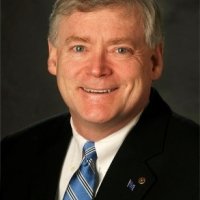
Mead Treadwell
former Lieutenant Governor, State of Alaska; former Chair, U.S. Arctic Research Commission
Lillian Brewster
Cedar Swan
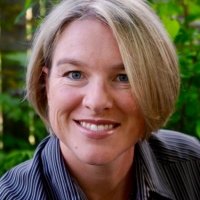
Jennifer Spence
Keynote Speaker
Moderators
Hosted By

Polar Institute
Since its inception in 2017, the Polar Institute has become a premier forum for discussion and policy analysis of Arctic and Antarctic issues, and is known in Washington, DC and elsewhere as the Arctic Public Square. The Institute holistically studies the central policy issues facing these regions—with an emphasis on Arctic governance, climate change, economic development, scientific research, security, and Indigenous communities—and communicates trusted analysis to policymakers and other stakeholders. Read more

Canada Institute
The mission of the Wilson Center's Canada Institute is to raise the level of knowledge of Canada in the United States, particularly within the Washington, DC policy community. Research projects, initiatives, podcasts, and publications cover contemporary Canada, US-Canadian relations, North American political economy, and Canada's global role as it intersects with US national interests. Read more

Environmental Change and Security Program
The Environmental Change and Security Program (ECSP) explores the connections between environmental change, health, and population dynamics and their links to conflict, human insecurity, and foreign policy. Read more
Thank you for your interest in this event. Please send any feedback or questions to our Events staff.

